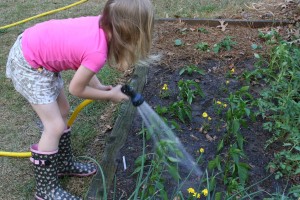Gone to Seed | Matthew 13:1-9, 18-23
The lectionary leads us to the parable† of the sower, or the parable of the seeds. Why not just read the whole chapter of Matthew 13? It will do us no harm. No one would read the first verse of Emily Dickinson’s “Because I Could Not Stop For Death” and stop reading, but we act as though we have an innate limitation to the number of verses of scripture we can endure.
Anyway.
 Whatever name we may give this passage, those of us who have spent any time at all around Christianity are familiar with the verses. Jesus talks about seed falling on a path, on rocky soil, among thorns, and on good soil. As we could have guessed without hearing the parable, the first three situations do not yield good results.
Whatever name we may give this passage, those of us who have spent any time at all around Christianity are familiar with the verses. Jesus talks about seed falling on a path, on rocky soil, among thorns, and on good soil. As we could have guessed without hearing the parable, the first three situations do not yield good results.
Three gospels contain a version of this parable—Mark, Matthew and Luke. All three of these gospels also contain versions of the explanation Jesus gives to his followers, who are not quick studies or bright students. The seeds and where they fall illustrate differing reactions to hearing the “word of the kingdom,” the gospel story itself.
The explanation comes across as a simple and rigid way of understanding the parable. While we like to comfort ourselves with the notion that we are the good soil—who wants to own up to being a thorn bush or a pile of rocks?—we also engage in a bit of Christianized schadenfreude, joy at the misfortune of others.
Oh, come on. Admit it. We do. There is something pleasant about pointing out the people whose minds are empty bird feeders and whose hearts are full of rocks, and we surely know better than to saunter into a briar patch.
That pleasure we take at the failures of others, mixed with the secret fear that we ourselves might stumble, goes a long way toward explaining why most of us don’t want to examine what Jesus is saying.
For instance, a friend once had the temerity to suggest to a group of church folk that the different soils might represent the differing states of our own hearts. Any of us might, she suggested, on any given day find that our hearts are like rocks, or we might end up impaled on the thorns of distraction. You can imagine the reception she got.
We don’t like being robbed of schadenfreude. And we don’t like people meddling with our preconceived notions of God, no matter who does it. Look where meddling got the prophets. Look where it got Jesus.
Here’s an even worse idea than the personal interpretation. Suppose that we, the folk who have heard the “word of the kingdom” and taken it to heart, are now the spiritual gardeners of this new Eden. As God casts the gospel story alongside the lives of people who have not heard it, suppose we are the ones responsible for preparing the soil. We are our neighbors’ gardeners. We are the rock finders, the weed pullers, the pruners of briars and thorns. We are the scarecrows.
Well that is no good, is it? That makes it sound as though we’re called to help the people around us. Yep, those people. The ones with stone hearts, brains like bird seed, and who are prickly all over. Now who gets to enjoy some schadenfreude, eh? Not us, not now. This thing was much more fun when we were spectators.
It explains why Jesus waited till he was seated in a boat, out on the water, before telling this parable. He k new the crowd on the shore. Maybe he didn’t want to be standing there when they figured out all of the implications.
You know how people can be. Welcome to your new garden.
† – Note on the word “Parable.” The word literally meant something like “thrown beside.” It was a story thrown out alongside a truth in order to illustrate the meaning.

